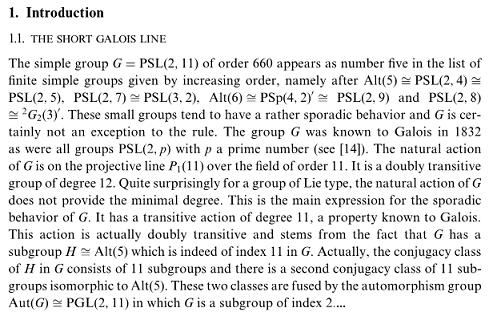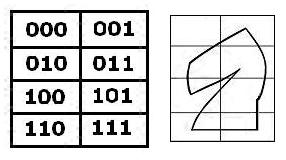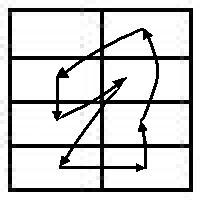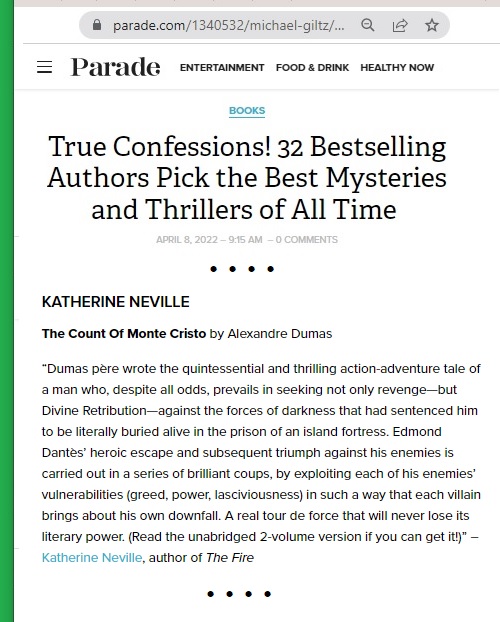
Saturday, October 19, 2024
Friday, October 11, 2024
From Katherine Neville’s Birthday, 2024

Fans of the Mark Helprin novel Refiner's Fire
may prefer today's previous post.
Related material —
https://www.google.com/maps/uv?pb=!1s0x89cd4470f2408055
%3A0x52a40e234571da51!3m1!7e115!4s%2Fmaps%2Fplace
%2Ffraternal%2Border%2Bof%2Beagles%2Bwarren%2Bpa
%2F%4041.8256498%2C79.1182066%2C3a%2C75y%2C201.02h
%2C90t%2Fdata%3D*213m4*211e1*213m2*211sQxSw86X9Fdo
LiETnmgh19w*212e0*214m2*213m1*211s0x89cd4470f2408055
%3A0x52a40e234571da51%3Fsa%3DX%26ved%3D2ahUKEwiD
xPC56oaJAxX0rokEHckFJ7cQpx96BAgUEAA!5sfraternal%20order
%20of%20eagles%20warren%20pa%20-%20Google%20Search!
15sCgIgARICCAI&imagekey=!1e2!2sQxSw86X9FdoLiETnmgh19w
&cr=le_a7&hl=en&ved=1t%3A206134&ictx=111
I personally prefer . . .
https://www.google.com/search?&q=brown+bunny+billboard .
Monday, May 20, 2024
Sunday, August 25, 2024
Log Lady Lines
From the post "Log Lady" of June 12, 2020 —
"Battle of White has raged on endlessly.
Everywhere Black will strive to seal his fate."
— Katherine Neville's chess novel The Eight
For Nathalie Emmanuel, star of the recent Francis Ford Coppola
extravaganza "Megalopolis" and, more impressively, of
a John Woo film released to streaming on Aug. 23 . . .

Wednesday, July 12, 2023
The Sunset of Dissolution
Dwight Garner today on the late Milan Kundera:
"Kundera’s novels, especially his later ones, could be abstract and
heavy-handed. His characters, at times, were little more than chess pieces.
Their author could be pretentious. His work is filled with observations such as:
'In the sunset of dissolution, everything is illuminated by the aura of nostalgia,
even the guillotine.' But his best fiction retains its moments of sweep and power."

Illustration for Florence King's 1989 review of The Eight , a novel
by Katherine Neville that features prominently the date April 4.
See also "Dissolution" in this journal.
Monday, February 13, 2023
Tuesday, June 14, 2022
Der Einsatz . . . Continues.
Katherine Neville, author of The Eight —
"Nine is a very powerful Nordic number."
in The Magic Circle , Ballantine paperback, 1999, p. 339.
Saturday, August 21, 2021
Comment
A Bon Jovi "Stripped" video released May 1, 2007 —

Synchronology check —
This journal in the early morning of the above release date —
"Nine is a very |
||||||||||||||
Wednesday, March 17, 2021
Sunday, August 23, 2020
Sprechen Sie Neutsch?
Sunday, June 14, 2020
PC Language Game
The above Nat Friedman is not to be confused with
the Nat Friedman of “Hyperseeing,” discussed here June 12.
“One game is real and one’s a metaphor.
Untold times this wisdom’s come too late.
Battle of White has raged on endlessly.
Everywhere Black will strive to seal his fate.
Continue a search for thirty-three and three.
Veiled forever is the secret door.”
— Katherine Neville, aka Cat Velis, in The Eight,
Ballantine Books, January 1989, page 140
Related literary remarks —
The Old Man and the Bull
The Old Man and the Topic

Friday, June 12, 2020
Log Lady
“Just as these lines that merge to form a key
Are as chess squares; when month and day are four;
Don’t risk another chance to move to mate.
One game is real and one’s a metaphor.
Untold times this wisdom’s come too late.
Battle of White has raged on endlessly.
Everywhere Black will strive to seal his fate.
Continue a search for thirty-three and three.
Veiled forever is the secret door.”
— Katherine Neville, aka Cat Velis, in The Eight,
Ballantine Books, January 1989, page 140
“One game is real and one’s a metaphor” —
Tuesday, June 9, 2020
Number
“Nine is a very powerful Nordic number.“
— Katherine Neville, author of The Eight
Wednesday, April 8, 2020
A Midrash for Steiner
(The late Mark Steiner, not the late George Steiner.)
See Katherine Neville’s novel The Eight ,
Log24 posts tagged Crucible Raiders, and
St. Isidore, whose feast day is April 4 —
Mark Steiner’s book The Applicability of Mathematics
as a Philosophical Problem (Harvard University Press, 2002,
$36.50) is available for free at a website named for St. Isidore.)
Saturday, December 28, 2019
Caballo Blanco
“The key is the cocktail that begins the proceedings.”
– Brian Harley, Mate in Two Moves
“Just as these lines that merge to form a key
Are as chess squares . . . .” — Katherine Neville, The Eight
“The complete projective group of collineations and dualities of the
[projective] 3-space is shown to be of order [in modern notation] 8! ….
To every transformation of the 3-space there corresponds
a transformation of the [projective] 5-space. In the 5-space, there are
determined 8 sets of 7 points each, ‘heptads’ ….”
— George M. Conwell, “The 3-space PG (3, 2) and Its Group,”
The Annals of Mathematics , Second Series, Vol. 11, No. 2 (Jan., 1910),
pp. 60-76.
“It must be remarked that these 8 heptads are the key to an elegant proof….”
— Philippe Cara, “RWPRI Geometries for the Alternating Group A8,” in
Finite Geometries: Proceedings of the Fourth Isle of Thorns Conference
(July 16-21, 2000), Kluwer Academic Publishers, 2001, ed. Aart Blokhuis,
James W. P. Hirschfeld, Dieter Jungnickel, and Joseph A. Thas, pp. 61-97.
Monday, December 2, 2019
D8: The Black Queen’s Square
The previous post quoted some dialogue from Victor Hugo's
novel about the French Revolution, Ninety-Three.
This suggests a look at the following non-fiction book:

Compare and contrast with the novel The Eight , by Katherine Neville,
about chess and the French Revolution.
Neville's birthday, April 4, plays a major role in her novel. The dies natalis
(in the Roman Catholic sense) of the above Birth of the Chess Queen
author, on the other hand, was reportedly November 20, 2019.
Following a link in this journal from November 20 leads to remarks
that might interest the subjects of an upcoming film, "The Two Popes."

Thursday, April 4, 2019
Saturday, March 23, 2019
Plan 9 Manifesto
"Arnheim was a particularly important source
for Norway's principal architectural theorist,
Christian Norberg-Schulz."
— Andrew Peter Steen, University of Queensland
doctoral thesis, 2015
See
- "Field of Manifestation,"
- "A Study in Art Education," and
-
"The Concept of Phenomenology in Architecture as Developed
by the Norwegian Theorist Christian Norberg-Schulz"
"Nine is a very powerful Nordic number."
— Katherine Neville, The Magic Circle
Friday, January 25, 2019
Design Theory
Last night's post "Night at the Social Media" suggests . . .
A 404 for Katherine Neville (born on 4/04) —
Thursday, January 24, 2019
Night at the Social Media
See also Katherine Neville, Karl Pribram, and Cooper Hewitt in this journal.
Thursday, August 9, 2018
True Grids
From a search in this journal for "True Grid,"
a fanciful description of the 3×3 grid —
"This is the garden of Apollo,
the field of Reason…."
– John Outram, architect
A fanciful instance of the 4×2 grid in
a scene from the film "The Master" —

A fanciful novel referring to the number 8,
and a not -so-fanciful reference:
Illustrated above are Katherine Neville's novel The Eight and the
"knight" coordinatization of the 4×2 grid from a page on the exceptional
isomorphism between PSL(3,2) (alias GL(3,2)) and PSL(2,7) — groups
of, respectively, degree 7 and degree 8.
Literature related to the above remarks on grids:
Ross Douthat's New York Times column yesterday purported, following
a 1946 poem by Auden, to contrast students of the humanities with
technocrats by saying that the former follow Hermes, the latter Apollo.
I doubt that Apollo would agree.
Friday, July 27, 2018
Friday, June 29, 2018
Analogies Between Analogies:
Literary Meditation for the Feast of SS Peter and Paul
Background: McLuhan on analogy.
See a publication offering facsimiles of the original 4×6 cards
of John Shade's "Pale Fire," as Nabokov described them.
Regarding these card proportions, note that 4/6 = 333/500, approximately —
the proportions of the text box in a post from yesterday.
"Continue a search for thirty-three and three" — Katherine Neville.
These rather pointless, but vaguely poetic, analogies were suggested by …
-
Yesterday morning's "The Corrections," a post
featuring spider ballooning and a dead poet, and
- "Blue Dream," a post of Feb. 11, 2006.
Thursday, April 5, 2018
D8
The above title may be regarded as a poetic variant
of the title of Katherine Neville's 1988 novel The Eight .
Related material —
See also The Black Queen, a note from 2001.
Thursday, March 8, 2018
Women’s Day: The Hateful Eight
Sunday, October 15, 2017
An Interesting Symbol
"His story is tragic and fascinating, but also
an interesting symbol for the 20th century."
— "Pawn Sacrifice" review by Jordan Hoffman,
Sept. 18, 2015
See as well William J. Lombardy's obituary in
today's online New York Times .
Other symbols —
Logo for a current New York Times series —
A 1989 New York Times illustration for Florence King's review of The Eight ,
a novel by Katherine Neville that features prominently the date April 4 —
Illustration by Rodrigo Shopis
See also recent posts now tagged Five Movements for Lombardy.
Wednesday, March 29, 2017
Design Abyss

Hexagram 29,
The Abyss (Water)
This post was suggested by an August 6, 2010, post by the designer
(in summer or fall, 2010) of the Stack Exchange math logo (see
the previous Log24 post, Art Space Illustrated) —
In that post, the designer quotes the Wilhelm/Baynes I Ching to explain
his choice of Hexagram 63, Water Over Fire, as a personal icon —
"When water in a kettle hangs over fire, the two elements
stand in relation and thus generate energy (cf. the
production of steam). But the resulting tension demands
caution. If the water boils over, the fire is extinguished
and its energy is lost. If the heat is too great, the water
evaporates into the air. These elements here brought in
to relation and thus generating energy are by nature
hostile to each other. Only the most extreme caution
can prevent damage."
See also this journal on Walpurgisnacht (April 30), 2010 —
|
Hexagram 29:
|
Hexagram 30: |
A thought from another German-speaking philosopher —
"Die Philosophie ist ein Kampf gegen die Verhexung
unsres Verstandes durch die Mittel unserer Sprache."
See also The Crimson 's abyss in today's 4:35 AM post Art Space, Continued.
Monday, February 20, 2017
At 3:33*
* A reference to a line in a poem in a novel
by Katherine Neville, The Eight (1988)
Sunday, December 25, 2016
Friday, November 11, 2016
Obituary Metaphysics
In memory of an art lecturer who reportedly died at 100
on Wednesday, November 9, 2016 —
"… an evening with Ms. Bernier was
a gateway to another realm."
— Robert D. McFadden,
New York Times online yesterday
Friday, October 21, 2016
Wednesday, August 31, 2016
The Lost Crucible
Yesterday's post The Eightfold Cube in Oslo suggests a review of
posts that mention The Lost Crucible.
(The crucible in question is from a book by Katherine Neville,
The Eight . Any connection with Arthur Miller's play "The Crucible"
is purely coincidental.)
Saturday, May 14, 2016
The Hourglass Code
A version of the I Ching’s Hexagram 19:
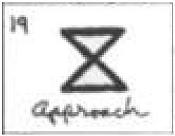
From Katherine Neville's The Eight , a book on the significance
of the date April 4 — the author's birthday —

|
The Eight by Katherine Neville —
“What does this have to do with why we’re here?” |
Related material: Posts now tagged Hourglass Code.
See also the hourglass in a search for Pilgrim's Progress Illustration.
Monday, April 4, 2016
Midnight for Paris

Illustration for Florence King's 1989 review of The Eight , a novel
by Katherine Neville that features prominently the date April 4.
Saturday, January 16, 2016
Global and Local
Two approaches to philosophy —
For a global perspective, see Cullinane College in this journal.
For a local perspective, see last night's post on a Pennsylvania philosopher.
Sunday, January 10, 2016
Sunday Morning Narrative
Madeleine L'Engle meets Captain America —
This is from a Jan. 27, 2012, post on mathematics and narrative.
Related literary criticism by the late Florence King —
"Given all the historical personages the author whistles in,
one more won't hurt. Nicolas Boileau, the 17th-century
French literary critic, gave writers a piece of advice that
Ms. Neville could use: 'Make not your tale of accidents
too full / too much variety will make it dull / Achilles' rage
alone, when wrought with skill /Abundantly does a whole
"Iliad" fill.' "
— NY Times review of The Eight , a novel by Katherine Neville
Field of Force
The title is adapted from that of George Steiner's book
Fields of Force: Fischer and Spassky at Reykjavik
(Published by Viking Adult on June 25, 1974.)
For fields of narrative force, see the previous post.
See as well a memorable review by the late Florence King
of the novel The Eight by Katherine Neville. An illustration
from that review (The New York Times , January 15, 1989) —
Related material: Closing the Circle (Log24, Sept. 24, 2009).
Monday, December 21, 2015
Slouching Towards Christmas (continued)
Under the Volcano:
A Bottle, a Door, a Box

See also Glory Season (Nov. 12, 2005) and Unique Figure (April 12, 2011).
Update of 11:22 AM —
Today in History —
"On December 21, 1937, 'Snow White and the Seven Dwarfs'
premiered to a record-breaking audience at the Carthay Circle
Theatre in Los Angeles."
Related material: The Red Book.
Thursday, June 11, 2015
Omega
Omega is a Greek letter, Ω , used in mathematics to denote
a set on which a group acts.
For instance, the affine group AGL(3,2) is a group of 1,344
actions on the eight elements of the vector 3-space over the
two-element Galois field GF(2), or, if you prefer, on the Galois
field Ω = GF(8).
Related fiction: The Eight , by Katherine Neville.
Related non-fiction: A remark by Werner Heisenberg
in this journal on Saturday, June 6, 2015, the eightfold cube ,
and the illustrations below —
|
Mathematics
The Fano plane block design |
Magic
The Deathly Hallows symbol— |
Sunday, February 15, 2015
Sunday School
"To Carthage then I came"
— The Waste Land , by T. S. Eliot
"To Carthage I came, where
there sang all around me in my ears
a cauldron of unholy loves."
— Confessions of St. Augustine, Book III
Saturday, February 14, 2015
Number and Time
"Continue a search for thirty-three and three."
— Katherine Neville in The Eight
"Close enough for government work."
— Stephen King in Doctor Sleep
Thursday, February 12, 2015
Capitalizing Car
Tuesday, October 28, 2014
Go Figure
For Karl Pribram and Katherine Neville,
a sequel to this morning's Figural Processing —
See also Christmas 2013.
Thursday, October 9, 2014
October Nine: Lyche at Bodø
Click to enlarge.
See also Apollo in this journal.
“Nine is a very powerful Nordic number.”
— Katherine Neville, who deserves some sort of prize for literature.

— Heidegger, “Hölderlin and the Essence of Poetry,”
translated by Douglas Scott, in Existence and Being ,
Regnery, 1949
Saturday, October 4, 2014
Nordic Number
“Nine is a very powerful Nordic number.”
— Katherine Neville, The Magic Circle
See also Arcade Fire in this journal.
Monday, September 15, 2014
The Eight
The image at the end of today’s previous post A Seventh Seal
suggests a review of posts on Katherine Neville’s The Eight .
Update of 1:25 PM ET on Sept. 15, 2014:
Neville’s longtime partner is neurosurgeon and cognitive theorist
Karl H. Pribram. A quote from one of his books:
See also Sense and Sensibility.
Sunday, August 10, 2014
Knight Moves
Some illustrations:
Chess Knight
(in German, Springer)
See also…
More technically (click image for details):
Sunday, June 1, 2014
Black Key
The title was suggested by a post on The Piano
and by the dimensions of an image in this morning’s
previous post: 404 x 211 pixels, suggesting
4/04, a date significant to author Katherine Neville,
and 2/11, the date of a Log24 post from 2014.
These dates are both related to the post…
Everybody Comes to Rick’s
(original title of Casablanca ).
Whimsical, yes, but see Iris Murdoch
on the contingent in literature and the word
“whimsical” in a post of January 26, 2004
(in a series of posts involving Michael Sprinker).
Saturday, April 5, 2014
A Princeton Half-Hour
"May you be in heaven a full half-hour
before the devil knows you're dead ."
Related material:
Yesterday's posts of 12 PM and 8 PM,
and the life of Philip Seymour Hoffman.
Friday, April 5, 2013
Reflections (continued)
From a search for Mirror-Play in this journal:

That search was suggested by a much lengthier
search, for Core, that itself was suggested
by yesterday's post (on Katherine Neville's birthday)
titled A Philosopher's Stone.
See, too, Tom Hanks (shown above as symbologist
Robert Langdon) in "Lucky Guy" (reviewed by TIME
yesterday), and a related poem:
Yes, you! You’re the Lucky One…
Prospective purchasers of the poet's work
may consult a press release from LSU Press
dated 4/4/2013. The poet died, apparently*
unlamented by his publisher, on 3/30.
* But only apparently.
The Crucible
"Though we had many pieces, we did not have the whole.
It was thirty years before we deciphered the formula.
But we did it at last.
There at night in the darkness of Fourier’s laboratory,
the four of us stood and watched the philosophers’ stone
forming in the crucible."
— The Eight , by Katherine Neville
(2008 Ballantine Books mass market edition, p. 640)
A journal post from August 25, 2009:
Image from a different journal earlier that same day, August 25, 2009:
Thirty-year medallion from Alcoholics Anonymous —
See also, in this journal, "The Eight" + Damnation.
Thursday, August 16, 2012
Raiders of the Lost Tesseract
(Continued from August 13. See also Coxeter Graveyard.)
Here the tombstone says
"GEOMETRY… 600 BC — 1900 AD… R.I.P."
In the geometry of Plato illustrated below,
"the figure of eight [square] feet" is not , at this point
in the dialogue, the diamond in Jowett's picture.
An 1892 figure by Jowett illustrating Plato's Meno—
Jowett's picture is nonetheless of interest for
its resemblance to a figure drawn some decades later
by the Toronto geometer H. S. M. Coxeter.
A similar 1950 figure by Coxeter illustrating a tesseract—
For a less scholarly, but equally confusing, view of the number 8,
see The Eight , a novel by Katherine Neville.
Thursday, July 5, 2012
Claves Regni Caelorum
Or: Night of Lunacy
From 9 PM Monday —

Note that the last line, together with the page number, forms
a sort of key—

The rest of the story—

For one reinterpretation of the page number 304, see a link—
Sermon— from Tuesday's post Diamond Speech.
The linked-to sermon itself has a link, based on a rereading
of 304 as 3/04, to a post of March 4, 2004, with…
WW and ZZ
as rendered by figures from the Kaleidoscope Puzzle—
Yesterday morning the same letter-combinations occurred
in a presentation at CERN of a newly discovered particle—
(Click for context.)
Since the particle under discussion may turn out to be the
God particle, it seems fitting to interpret WW and ZZ as part
of an imagined requiem High Mass.
Ron Howard, director of a film about CERN and the God particle,
may regard this imaginary Mass as performed for the late
Andy Griffith, who played Howard's father in a television series.
Others may prefer to regard the imaginary Mass as performed
for the late John E. Brooks, S. J., who served as president of
The College of the Holy Cross, Worcester, Mass., for 24 years.
Griffith died Tuesday. Brooks died Monday.
For some background on the Holy Cross, see posts of
Sept. 14 (Holy Cross Day) and Sept. 15, 2010—
For more lunacy, see…
Continue a search for thirty-three and three
— Katherine Neville, The Eight
Thursday, April 12, 2012
Thursday, April 5, 2012
Go Ask Emma*
From Katherine Neville's novel The Eight (see also April 4, Der Einsatz )—

"You walked out of my dreams and into my car…"
* Frost
Wednesday, April 4, 2012
Der Einsatz
|
”Confusion is nothing new.” |
(This may serve as today’s tribute to Katherine Neville.)
Friday, April 8, 2011
Hello Note
(Continued from yesterday's Brightness at Noon, Afternoon Delight, and Goodbye Note.)
"The Catholic Church, through the Holy Office, has declared it is not lawful 'to take part in spiritualistic communications or manifestations of any kind, whether through a so-called medium or without one, whether hypnotism is used or not, even with the best of intentions among the participants, whether for the purpose of interrogating the souls of the departed or spiritual beings, whether by listening to their responses or even in idle curiosity, even with the tacit or express protestation of not having anything to do with the evil spirits' (Denzinger 3642*).
Behind the church's attitude toward Spiritualism is the concern that a Catholic would expose himself to the risk of actually dealing with the evil spirit. The assumption is that if fraud or deception are excluded, and manifestations occur that are beyond natural explanation, the active agent in these cases is neither God nor any one of the good spirits (whether angelic or human) but demonic forces that are sure to mislead the Catholic and endanger the integrity of his faith."
* 3642 2182 Qu.: An liceat per Medium, ut vocant, vel sine Medio, adhibito vel non hypnotismo, locutionibus aut manifestationibus spiritisticis quibuscumque adsistere, etiam speciem honestatis vel pietatis praeseferentibus, sive interrogando animas aut spiritus, sive audiendo responsa, sive tantum aspiciendo, etiam cum protestatione tacita vel expressa, nullam cum malignis spiritibus partem se habere velle. Resp.: (cfirm. a S. P'ce, 26 avril): Negative in omnibus.
See also The Ecclesiastical Review , Volume 57,
by Catholic University of America, page 186.
This volume, from Harvard University, was digitized on June 19, 2008.
Katherine Neville, The Eight—
"Continue a search for thirty-three and three.
Veiled forever is the secret door."
See also The Maker's Gift.
* Corrected Dec. 14, 2014, from "Combinatorial."
Tuesday, September 7, 2010
Burning Patrick —
Notes on Mathematics and Narrative
Background—
- The Burning Man in Bester's classic The Stars My Destination,
- The not-so-classic Hitler Plans Burning Man, and
- The cult film The Wicker Man
Commentary on The Wicker Man—
Originally The Wicker Man was not well-received by critics in the UK. It was considered
to be bizarre, disturbing, and uncomfortable, with the hasty editing making the story confusing
and out of order…. Today this movie is considered a cult classic and has been called
the “Citizen Kane of horror films” by some reviewers. How did this film become a cult classic?
Real estate motto— Location, Location, Location.
Illustration— The fire leap scene from Wicker Man, filmed at Castle Kennedy—

In today's New York Times, Michiko Kakutani reviews a summer thriller
by Kevin Guilfoile. The Thousand is in the manner of Dan Brown's
2003 The Da Vinci Code or of Katherine Neville's 1988 The Eight .
From the review—
What connects these disparate events, it turns out, is a sinister organization
called the Thousand, made up of followers of the ancient Greek mathematician
and philosopher Pythagoras (yes, the same Pythagoras associated with
the triangle theorem that we learned in school).
As Mr. Guilfoile describes it, this organization is part Skull and Bones,
part Masonic lodge, part something much more twisted and nefarious….
The plot involves, in part,
… an eccentric artist’s mysterious masterwork, made up of thousands of
individually painted tiles that may cohere into an important message….
Not unlike the tiles in the Diamond Theory cover (see yesterday's post)
or, more aptly, the entries in this journal.
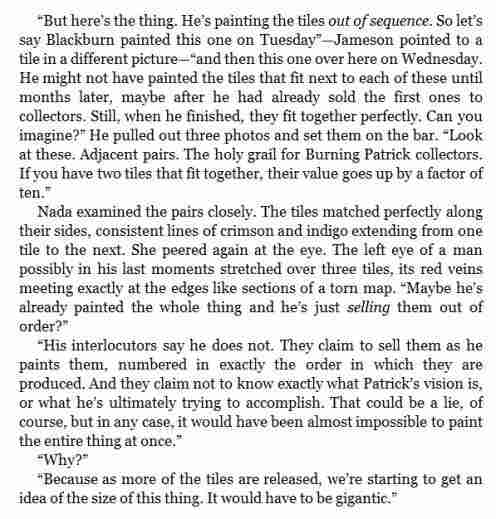
A brief prequel to the above dialogue—

In lieu of songs, here is a passage by Patrick Blackburn
more relevant to the art of The Thousand—
See also the pagan fire leaping in Dancing at Lughnasa.
Friday, August 27, 2010
Mathematics and Narrative continued…
Narrative Sequence
In today's New York Times, Michiko Kakutani reviews a summer thriller by Kevin Guilfoile. The Thousand is in the manner of Dan Brown's 2003 The Da Vinci Code or of Katherine Neville's 1988 The Eight .
From the review—
What connects these disparate events, it turns out, is a sinister organization called the Thousand, made up of followers of the ancient Greek mathematician and philosopher Pythagoras (yes, the same Pythagoras associated with the triangle theorem that we learned in school).
As Mr. Guilfoile describes it, this organization is part Skull and Bones, part Masonic lodge, part something much more twisted and nefarious….
The plot involves, in part,
… an eccentric artist’s mysterious masterwork, made up of thousands of individually painted tiles that may cohere into an important message….
Not unlike the tiles in the Diamond Theory cover (see yesterday's post) or, more aptly, the entries in this journal.

Sunday, May 23, 2010
Sunday School
"Mathematics is forever."
— Gian-Carlo Rota
"Nine is a very powerful
Nordic number."
— Katherine Neville
"Nine tailors make a man."
— Dorothy Sayers
Friday, April 30, 2010
Bridge to Nowhere
(continued from April 26, 28, and 29):
|
Hexagram 29:
|
Hexagram 30: |
Excerpt from The Fire,
by Katherine Neville —
"'Alaska's Aleutian Trench,' Key told us…. 'It's called the Ring of Fire because it boasts the largest collection of active volcanoes in the world.'….
'But you said that my father's not in Alaska…. So what does this Ring of Fire have to do with the place where we're actually going?'
'It's the Yellow Brick Road,' she told me."

Tuesday, April 13, 2010
Identity Crisis
Some sources of identity…
| For Jason Bourne–
|
(co-writer of "Romancing the Stone"), from March 22, 2005 – "The Enemy"–
|
Tuesday October 5, 2004The Joyce Identity, From The Bourne Identity: ABBOTT: Can you really bring him in?
CONKLIN: Well why don’t you go upstairs and book a conference room. Maybe you can talk him to death. |
Related material: Stanley Fish's column on Habermas in today's NY Times and Habermas in this journal. (Some references to Habermas occur only in links.)
Material with some relevance to the concept of romancing the stone—
Entries of June 28-29, 2008, and March 22, 2005, and
Object lesson (Sunday, July 1, 2007)
Sunday, April 4, 2010
Virgil Vigil
Two definitions–
"In Dante's Inferno the Harrowing of Hell is mentioned in Canto IV by the pilgrim's guide Virgil." —Wikipedia
"The Easter Vigil…. is held in the hours of darkness between sunset on Holy Saturday and sunrise on Easter Day." —Wikipedia
Two more, of acronyms coined by Philip Rieff—
"Rieff is critical of the present 'pop' culture that glories in the 'primacies of possibility' and prefers 'both/and' to 'either/or.' … the 'via'— the 'vertical in authority'—… teaches us our place as we assent to and ascend on via’s ladder." —Philip Manning
Related material:
The infinity symbol, as sketched in a touching
attempt at scholarship by the late
"both/and" novelist David Foster Wallace—



Lemniscate with Cartesian cross—



Saturday, March 6, 2010
Symbology continued
The Magic Lyre
The front page of tomorrow's New York Times Book Review is devoted to a new novel titled Angelology.
Detail of the front page, top right corner–
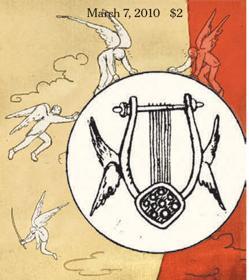
"…this will be popular for fans of such historical thrillers as… Katherine Neville's The Eight." —Library Journal
The New York Times review is more flattering– "a terrifically clever thriller– more Eco than Brown…."
Related historical remarks–
the symbology novels of Dan Brown and…
TIME magazine cover, issue
dated March 15, 2010–
"History Maker: How Tom Hanks is
redefining America's past"
For some theological background to
this post and today's noon post,
see the use of the word "harrowing"
in this journal — particularly on
April 19, 2003– Holy Saturday.
Monday, September 21, 2009
Monday September 21, 2009
A Google search for "Das Scheinen," a very rough translation into Heidegger's German of "The Shining," leads to a song. A search for the English version of the song leads to a site with a sidebar advertising Pearl Jam's new (Sept. 20) album "Backspacer."
Happy birthday,
Stephen King.
Background:
Yesterday's entries
and the plot of
L'Engle's classic
A Wrinkle in Time.
(See this journal's entries
for March 2008.)
The Pearl Jam album cover art
is of particular interest in light
of King's story "Apt Pupil" and
of Katherine Neville's remark
"Nine is a very powerful
Nordic number."
Those who prefer more sophisticated
aesthetic theory may click on the
following keys:
Tuesday, July 28, 2009
Tuesday July 28, 2009
Anniversary

The Associated Press this morning —
“Today’s Highlight in History:
Plot summary by “Anonymous” at imdb.com of a feminist film version of “The Tempest” (now in post-production):
Taymor’s “Tempest” stars, as Prospera, the famed portrayer of monarchs Helen Mirren. Another work dealing with alchemy suitable for Mirren (who is also known as Detective Inspector Jane Tennison):

Tuesday, July 14, 2009
Tuesday July 14, 2009
Elements
of Finite Geometry
Some fans of the alchemy in
Katherine Neville’s novel
The Eight and in Dan Brown’s
novel Angels & Demons may
enjoy the following analogy–

Note that the alchemical structure
at left, suited more to narrative
than to mathematics, nevertheless
is mirrored within the pure
mathematics at right.
Related material
on Galois and geometry:
| Geometries of the group PSL(2, 11) by Francis Buekenhout, Philippe Cara, and Koen Vanmeerbeek. Geom. Dedicata, 83 (1-3): 169–206, 2000–
|
Saturday, April 4, 2009
Saturday April 4, 2009
The Eight

Other knight figures:
Click on the SpringerLink
knight for a free copy
(pdf, 1.2 mb) of
the following paper
dealing with the geometry
underlying the R.T. Curtis
knight figures above:

Context:
Literature and Chess and
Sporadic Group References
Details:
| Adapted (for HTML) from the opening paragraphs of the above paper, W. Jonsson's 1970 "On the Mathieu Groups M22, M23, M24…"–
"[A]… uniqueness proof is offered here based upon a detailed knowledge of the geometric aspects of the elementary abelian group of order 16 together with a knowledge of the geometries associated with certain subgroups of its automorphism group. This construction was motivated by a question posed by D.R. Hughes and by the discussion Edge [5] (see also Conwell [4]) gives of certain isomorphisms between classical groups, namely
where A8 is the alternating group on eight symbols, S6 the symmetric group on six symbols, Sp(4,2) and PSp(4,2) the symplectic and projective symplectic groups in four variables over the field GF(2) of two elements, [and] PGL, PSL and SL are the projective linear, projective special linear and special linear groups (see for example [7], Kapitel II). The symplectic group PSp(4,2) is the group of collineations of the three dimensional projective space PG(3,2) over GF(2) which commute with a fixed null polarity tau…." References 4. Conwell, George M.: The three space PG(3,2) and its group. Ann. of Math. (2) 11, 60-76 (1910). 5. Edge, W.L.: The geometry of the linear fractional group LF(4,2). Proc. London Math. Soc. (3) 4, 317-342 (1954). 7. Huppert, B.: Endliche Gruppen I. Berlin-Heidelberg-New York: Springer 1967. |
Sunday, January 18, 2009
Sunday January 18, 2009
Part I: The Pagan View
From The Fire, Katherine Neville's sequel to her novel The Eight:
"'Cat…. realized that we all need some kind of a chariot driver to pull our forces together, like those horses of Socrates, one pulling toward heaven, one toward the earth….'
… I asked, 'Is that why you said my mother's and my birthdays are important? Because April 4 and October 4 are opposite in the calendar?'
Rodo beamed a smile…. He said, 'That's how the process takes place….'"
Part II: The Christian View
"The Calendar of saints is a traditional Christian method of organizing a liturgical year by associating each day with one or more saints and referring to the day as that saint's feast day. The system arose from the very early Christian custom of annual commemoration of martyrs on the dates of their deaths, or birth into heaven, and is thus referred to in Latin as dies natalis ('day of birth')." –Wikipedia
The October 4 date above, the birthday of Cat's daughter, Xie, in The Fire, is also the liturgical Feast of St. Francis of Assisi (said by some to be also the date of his death).
The April 4 date above is Neville's birthday and that of her alter ego Cat in The Eight and The Fire. Neville states that this is also the birth date of Charlemagne. It is, as well, the dies natalis (in the "birth into heaven" sense), of Dr. Martin Luther King.
For more about April 4, see Art Wars and 4/4/07.
For more about October 4, see "Revelation Game Continued: Short Story."
"et lux in tenebris lucet
et tenebrae eam
non comprehenderunt"
Wednesday, January 14, 2009
Tuesday, January 13, 2009
Tuesday January 13, 2009
Something Traditional —
“German Chancellor Dr. Angela Merkel is the Charlemagne Prize laureate of 2008…. The prize will be awarded on 1 May, Ascension Day.”
Something Modern —
Previously undescribed in this journal:

| A NOTE BY THE DESIGNER
“The traditional chess set, with its naturalistic images of medieval armies, suggests a game between combatants who enjoy the winning of battles. This chess set, with its articulated images of abstract force, suggests a game between contestants who enjoy the process of thinking.
The primary principle of this design… is that the operating reality or function of each piece– both its value and how it moves– is embodied in a simple self-expressive form….  Design Copyright F. Lanier Graham 1967
— F. Lanier Graham, 1967 |
Related material: this journal on the First of May, 2008, the date of last year’s Charlemagne award.
Thursday, October 30, 2008
Thursday October 30, 2008
Katherine Neville, author of perhaps the greatest bad novel of the twentieth century, The Eight, has now graced a new century with her sequel, titled The Fire. An excerpt:
“Our family lodge had been built at about this same period in the prior century, by neighboring tribes, for my great-great-grandmother, a pioneering mountain lass. Constructed of hand-hewn rock and massive tree trunks chinked together, it was a huge log cabin that was shaped like an octagon– patterned after a hogan or sweat lodge– with many-paned windows facing in each cardinal direction, like a vast, architectural compass rose.
……..
From here on the mountaintop, fourteen thousand feet atop the Colorado Plateau, I could see the vast, billowing sea of three-mile-high mountain peaks, licked by the rosy morning light. On a clear day like this, I could see all the way to Mount Hesperus– which the Diné call Dibé Nitsaa: Black Mountain. One of the four sacred mountains created by First Man and First Woman.Together with Sisnaajinii, white mountain (Mt. Blanca) in the east; Tsoodzil, blue mountain (Mt. Taylor) in the south, and Dook’o’osliid, yellow mountain (San Francisco Peaks) in the west, these four marked out the four corners of Dinétah– ‘Home of the Diné,’ as the Navajo call themselves.
And they pointed as well to the high plateau I was standing on: Four Corners, the only place in the U.S. where four states– Colorado, Utah, New Mexico, and Arizona– come together at right angles to form a cross.”
Related material
(Oct. 14, 2004):
|
The Eight
Lest the reader of the previous entry mistakenly take Katherine Neville’s book The Eight more seriously than Fritz Leiber’s greatly superior writings on eightness, here are two classic interpretations of Leiber’s “spider” or “double cross” symbol:
|
The eight-rayed star may be taken
as representing what is known
in philosophy as a “universal.”
See also
Tuesday, May 1, 2007
Tuesday May 1, 2007
2:45 AM
I could tell you a lot,
but you gotta be
true to your code.
— Sinatra
…da ist der Tanz;
Doch weder Stillstand noch Bewegung.
Und nenne es nicht Beständigkeit,
Wo Vergangenheit und Zukunft sich sammeln.
|
|
|
| to put one's back into something |
bei etwas Einsatz zeigen |
| to up the ante |
den Einsatz erhöhen |
| to debrief | den Einsatz nachher besprechen |
| to be on duty |
im Einsatz sein |
| mil.to be in action | im Einsatz sein |
| to play for high stakes |
mit hohem Einsatz spielen |
"Nine is a very
powerful Nordic number."
— Katherine Neville,
The Magic Circle
Friday, April 20, 2007
Friday April 20, 2007
Part I
|
The Library of Congress “American sculptor Daniel Chester French was born in Exeter, New Hampshire on April 20, 1850. His colossal seated figure of Abraham Lincoln presides over the Lincoln Memorial. Reared in Cambridge and Concord, Massachusetts, he was embraced by members of the Transcendentalist community including Ralph Waldo Emerson. Author and fellow Concord resident Louisa May Alcott encouraged young French to pursue a career as an artist. Louisa’s sister, artist May Alcott, was his early teacher. French studied in Boston and New York prior to receiving his first commission for the 1875 statue The Minute Man. Standing near the North Bridge in Concord, in the Minute Man National Historical Park, this work commemorates events at the North Bridge, the site of ‘the shot heard ’round the world.’ An American icon, images derivative of The Minute Man statue appeared on defense bonds, stamps, and posters during World War II.” |
 |
Log24 on the anniversary of
Lincoln’s assassination —
|
Saturday, April 14, 2007 4:30 AM The Sun Also Sets, or… This Way to
the Egress Continued from April 12: “I have only come here
— Robert Stone, |
Log24 entry of
November 7, 2003 —
 |
— and a
student play from
Virginia Tech:

Part V:
Symmetry
for Beavis and Butt-Head
and
The Rhetoric of Scientism:
It’s a very ancient saying,
But a true and honest thought,
That if you become a teacher,
By your pupils you’ll be taught.
— Oscar Hammerstein,
“Getting to Know You”
Saturday, April 14, 2007
Saturday April 14, 2007
the Egress
Continued from April 12:
“I have only come here
seeking knowledge,
Things they would not
teach me of in college….”
— Synchronicity lyrics
|
Quoted in Log24,
Time’s Labyrinth continued: “The sacred axe was used to kill the King. The ritual had been the same since the beginning of time. The game of chess was merely a reenactment. Why hadn’t I recognized it before?”
— Katherine Neville,
The Eight, Ballantine reprint, 1990, |
“Know the one about
the Demiurge and the
Abridgment of Hope?”
— Robert Stone,
A Flag for Sunrise,
Knopf, 1981,
the final page:
Thursday, March 8, 2007
Thursday March 8, 2007
Mujer Trabajadora

“Yo es que nací un 8 de marzo,
Día de la Mujer Trabajadora,
y no he hecho más que
trabajar toda mi vida.”
For background on Aldecoa,
see a paper (pdf) by
Sara Brenneis:
“Josefina Aldecoa intertwines
history, collective memory
and individual testimony in her
historical memory trilogy…”
The Triangle Shirtwaist Factory Fire in New York City on March 25, 1911, was the largest industrial disaster in the history of the city of New York, causing the death of 146 garment workers who either died in the fire or jumped to their deaths.
Propaganda, March 1977:
“On March 8, 1908, after the death of 128 women trapped in a fire at the Triangle Shirtwaist Factory in New York City, 15,000 women workers from the garment and textile industry marched echoing the demands of their sisters 50 years earlier…”
Propaganda, March 2006:
“First of all, on March 8th, 1857, a large number of factory workers in the United States took to the streets to demand their economic and political rights. The owners called the police who arrived immediately and opened fire, engaging in blind repression… Later on, in 1908, the same date of March 8th was once again a memorable date of struggle. On this day, capitalist bosses in Chicago set fire to a textile factory where over a thousand women worked. A very large number was terribly burnt. 120 died!”
Propaganda disguised as news, March 2007:
From today’s top story in 24 HoursTM, a commuter daily in Vancouver published by Sun Media Corporation:
Fight still on for equality
By Robyn Stubbs and Carly Krug
“International Women’s Day commemorates a march by female garment workers protesting low wages, 12-hour workdays and bad working conditions in New York City on March 8, 1857.
Then in 1908, after 128 women were trapped and killed in a fire at a New York City garment and textile factory, 15,000 women workers again took their protests to the street.”
Related historical fiction:
A version of the
I Ching’s Hexagram 19:


— Katherine Neville, The Eight
|
“What does this have to do with why we’re here?”
“I saw it in a chess book Mordecai showed me. The most ancient chess service ever discovered was found at the palace of King Minos on Crete– the place where the famous Labyrinth was built, named after this sacred axe. The chess service dates to 2000 B.C. It was made of gold and silver and jewels…. And in the center was carved a labrys.” … “But I thought chess wasn’t even invented until six or seven hundred A.D.,” I added. “They always say it came from Persia or India. How could this Minoan chess service be so old?” “Mordecai’s written a lot himself on the history of chess,” said Lily…. “He thinks that chess set in Crete was designed by the same guy who built the Labyrinth– the sculptor Daedalus….” Now things were beginning to click into place…. “Why was this axe carved on the chessboard?” I asked Lily, knowing the answer in my heart before she spoke. “What did Mordecai say was the connection?”…. “That’s what it’s all about,” she said quietly. “To kill the King.” The sacred axe was used to kill the King. The ritual had been the same since the beginning of time. The game of chess was merely a reenactment. Why hadn’t I recognized it before? |
Perhaps at the center of
Aldecoa’s labyrinth lurk the
capitalist bosses from Chicago
who, some say, set fire
to a textile factory
on this date in 1908.
For a Freudian perspective
on the above passage,
see yesterday’s entry
In the Labyrinth of Time,
with its link to
John Irwin‘s essay
“The False Artaxerxes:
Borges and the
Dream of Chess.”

Symbols
S. H. Cullinane
March 7, 2007
Today, by the way, is the
feast of a chess saint.
Thursday, November 9, 2006
Thursday November 9, 2006
Hour of the Wolf
Today is Schicksalstag, the “day of fate” in German history.
This entry’s time slot, 3:00 AM ET– which some say is the beginning of “the hour of the wolf*”– was reserved earlier for some entry appropriate to the day. (Actual time of this entry: about 12:48 PM ET).
| Markus Wolf, East German Spymaster, Dies at 83 By THE ASSOCIATED PRESS Published: Thursday, Nov. 9, 2006 Filed at 11:16 a.m. ET BERLIN (AP) — Markus Wolf, the ”man without a face” who outwitted the West as communist East Germany’s long-serving spymaster, died Thursday [Nov. 9, 2006]. He was 83. Wolf died in his apartment in Berlin, his stepdaughter Claudia Wall said in a statement. The cause of his death, on the 17th anniversary of the fall of the Berlin Wall, was not released. |
Related material
from Aug. 6, 2006:
| Game Boy
Click on picture for details.
“Nine is a very
powerful Nordic number.” — Katherine Neville
|
||||||||||||||
* “Wolf” — See the etymological notes
in The Shining of May 29.
Saturday, September 16, 2006
Saturday September 16, 2006
Pandora's Box
Part I:
The Pandora Cross
— Rosalind Krauss in "Grids"

Part II:
The Opening
Remarks by the Pope on Sept. 12,
as reported by the Vatican:
Faith, Reason, and the University:
Memories and Reflections
For the result of
the Pope's remarks, see
a transcript of
yesterday's Google News
and the following
from BBC today:

Click to enlarge the screenshot.
Part III:
Hope
"In September [2005], she had a private audience with Pope Benedict XVI at Castel Gandolfo, his summer residence outside Rome. She had criticized John Paul II for making overtures to Muslims, and for not condemning terrorism heartily enough, but she has hopes for Joseph Ratzinger."
For further details, see yesterday's Log24.
Part IV:
The Sibyl's Song
— From The Magic Circle,
a spiritual narrative
by Katherine Neville
For more on "the long-mute voice
of the past," on "darkness beneath
the volcano," and on uncorking,
see Glory Season and Harrowing.
Related material from
Log24 on Dec. 2, 2005:
Benedict XVI, before he became Pope:

and a related
Christian symbol,

the Greek Cross
(adapted from
Ad Reinhardt).
Moral of the Pandora Cross:
"Nine is a very powerful Nordic number."
— Katherine Neville in The Magic Circle…
quoted in The Nine, a Log24 entry
for Hermann Weyl's birthday,
November 9, 2004.
Sunday, August 6, 2006
Sunday August 6, 2006
powerful Nordic number."
— Katherine Neville
|
|
|
| to put one's back into something |
bei etwas Einsatz zeigen |
| to up the ante |
den Einsatz erhöhen |
| to debrief | den Einsatz nachher besprechen |
| to be on duty |
im Einsatz sein |
| mil.to be in action | im Einsatz sein |
| to play for high stakes |
mit hohem Einsatz spielen |
Score:
"His music had of course come from Russian folk sources and from Rimsky-Korsakov and from other predecessors, in the way that all radical art has roots. But to be a true modernist, a cosmopolitan in the twentieth century, it was necessary to seem to disdain nationalism, to be perpetually, heroically novel– the more aloof, the better. 'Cold and transparent, like an "extra dry" champagne, which gives no sensation of sweetness, and does not enervate, like other varieties of that drink, but burns,' Stravinsky said about his own Octet, Piano Concerto, and Piano Sonata. The description might be applied to works by Picasso or Duchamp."
— Michael Kimmelman in
The New York Review of Books,
issue dated Aug. 10, 2006
Perhaps.
But the description
certainly applies to
Bridget Moynahan:

"… like an 'extra dry' champagne,
which gives no sensation of
sweetness, and does not enervate."
For more on the
"Ice 9" figure, see
Balanchine's Birthday.
Friday, August 4, 2006
Friday August 4, 2006
ART WARS
continued from
previous entry
In memory of
Elisabeth Schwarzkopf:
This question might
well be posed by…

Rosalind Krauss,
Meyer Schapiro Professor
of Modern Art and Theory
at Columbia University
(Ph.D., Harvard U., 1969).
"The grid is a staircase to the Universal….
We could think about Ad Reinhardt, who,
despite his repeated insistence that
'Art is art,'
ended up by painting a series of…
nine-square grids in which the motif
that inescapably emerges is
a Greek cross.

Adapted from
Ad Reinhardt
There is no painter in the West
who can be unaware of
the symbolic power
of the cruciform shape and the
Pandora's box of spiritual reference
that is opened once one uses it."
— Rosalind Krauss in "Grids"
"Nine is a very powerful Nordic number."
— Katherine Neville, author of The Eight
Related material:
Wednesday, December 7, 2005
Wednesday December 7, 2005
(continued)
1:00:19 EST
The Lion, the Witch
and the Wardrobe
premieres tonight at
the Royal Albert Hall.
Hexagram 19 in the
Cullinane series:


— Katherine Neville, The Eight
|
“What does this have to do with why we’re here?”
“I saw it in a chess book Mordecai showed me. The most ancient chess service ever discovered was found at the palace of King Minos on Crete– the place where the famous Labyrinth was built, named after this sacred axe. The chess service dates to 2000 B.C. It was made of gold and silver and jewels…. And in the center was carved a labrys.” … “But I thought chess wasn’t even invented until six or seven hundred A.D.,” I added. “They always say it came from Persia or India. How could this Minoan chess service be so old?” “Mordecai’s written a lot himself on the history of chess,” said Lily…. “He thinks that chess set in Crete was designed by the same guy who built the Labyrinth– the sculptor Daedalus….” Now things were beginning to click into place…. “Why was this axe carved on the chessboard?” I asked Lily, knowing the answer in my heart before she spoke. “What did Mordecai say was the connection?”…. “That’s what it’s all about,” she said quietly. “To kill the King.” The sacred axe was used to kill the King. The ritual had been the same since the beginning of time. The game of chess was merely a reenactment. Why hadn’t I recognized it before? |
|
“But what does it all mean?” asked Susan when they were somewhat calmer. “It means,” said Aslan, “that though the Witch knew the Deep Magic, there is a magic deeper still which she did not know. Her knowledge goes back only to the dawn of Time. But if she could have looked a little further back, into the stillness and the darkness before Time dawned, she would have read there a different incantation. She would have known that when a willing victim who had committed no treachery was killed in a traitor’s stead, the Table would crack and Death itself would start working backward.” |
Saturday, December 3, 2005
Saturday December 3, 2005
Works and Days
“So, after all, there was not one kind of Strife alone, but all over the earth there are two…. For one fosters evil war and battle, being cruel: her no man loves; but perforce, through the will of the deathless gods, men pay harsh Strife her honour due.”
On this date in 1944, “A bitter civil war broke out in Athens….”
“Cambridge was colder and darker and offered even fewer distractions than before the war. By June, 1943, Minakis had done the maths tripos with honors…. He read Cavafy and Seferis and T.S. Eliot:
There will be time, there will be time
To prepare a face to meet the faces that you meet;
There will be time to murder and create,
And time for all the works and days of hands
That lift and drop a question on your plate…
Minakis was happy for his colleagues when the war ended but felt little on his own account or that of the country he had left; the Greek government was a British prop that could not feed its people, the Communists and the Monarchists were at one another’s throats like savage dogs, and civil war was inevitable.
Better to return to grim Cambridge….”
Saturday, May 14, 2005
Saturday May 14, 2005
"Nine is a very powerful Nordic number."
— Katherine Neville, author of The Eight,

"To live is to defend a form."
("Leben, das heisst eine Form verteidigen")
— attributed to Hölderlin
In defense of the nine-square grid:

For details on the above picture, see
Translation Plane.
Tuesday, November 9, 2004
Tuesday November 9, 2004
The Nine
(Readings for
Weyl’s birthday)
“The grid is a staircase to the Universal….
We could think about Ad Reinhardt, who,
despite his repeated insistence that
‘Art is art,’
ended up by painting a series of…
nine-square grids in which the motif
that inescapably emerges is
a Greek cross.

Greek Cross
There is no painter in the West
who can be unaware of
the symbolic power
of the cruciform shape and the
Pandora’s box of spiritual reference
that is opened once one uses it.”
— Rosalind Krauss,
Meyer Schapiro Professor
of Modern Art and Theory
at Columbia University
(Ph.D., Harvard U., 1969),
in “Grids”

“Nine is a very powerful Nordic number.”
— Katherine Neville, author of The Eight,

in The Magic Circle,
Ballantine paperback,
1999, p. 339

“To live is to defend a form.”
(“Leben, das heisst eine Form verteidigen“)
— attributed to Hölderlin

For details on the above picture,
which deals with properties of the
nine-square grid, see
For more on the defense
of this form,

see the Log24.net entry of
June 5, 2004, A Form,
and the Art Wars entries
for St. Peter’s Day, 2004.
Thursday, October 14, 2004
Thursday October 14, 2004
Star Wars,
continued
The Eight
Lest the reader of the previous entry mistakenly take Katherine Neville’s book The Eight more seriously than Fritz Leiber’s greatly superior writings on eightness, here are two classic interpretations of Leiber’s “spider” or “double cross” symbol:
|
Aristotle: |
|
Less impressive, but not
completely without interest,
is the six-pointed star:

This symbol consists of
two triangles

representing
male and female,
fire and water,
up and down,
etc., etc., etc.
For some deeper properties
of the number eight, see a
Log24.net entry of 4/4/03.
Thursday, April 1, 2004
Thursday April 1, 2004
Thirty-Three and Three
“Continue a search for thirty-three and three.
Veiled forever is the secret door.”
— Katherine Neville, aka Cat Velis, in The Eight,
Ballantine Books, January 1989, page 140
Wednesday, September 10, 2003
Wednesday September 10, 2003
4:04:08
The title refers to my entry of last April 4,
and to the time of this entry.
From D. H. Lawrence and the Dialogical Principle:
“Plato’s Dialogues…are queer little novels….[I]t was the greatest pity in the world, when philosophy and fiction got split. They used to be one, right from the days of myth. Then they went and parted, like a nagging married couple, with Aristotle and Thomas Aquinas and that beastly Kant. So the novel went sloppy, and philosophy went abstract-dry. The two should come together again, in the novel.”
— pp. 154-5 in D. H. Lawrence, “The Future of the Novel,” in Study of Thomas Hardy and Other Essays. Ed. Bruce Steele. Cambridge: Cambridge University Press,1983. 149-55.
“The wild, brilliant, alert head of St. Mawr seemed to look at her out of another world… the large, brilliant eyes of that horse looked at her with demonish question…. ‘Meet him half way,’ Lewis [the groom] said. But halfway across from our human world to that terrific equine twilight was not a small step.”
— pp. 30, 35 in D. H. Lawrence, “St. Mawr.” 1925. St. Mawr and Other Stories. Ed. Brian Finney. Cambridge: Cambridge University Press, 1983.
See also
Plato, Pegasus, and the Evening Star.
Katherine Neville’s novel The Eight, referred to in my note of April 4, is an excellent example of how not to combine philosophy with fiction. Lest this be thought too harsh, let me say that the New Testament offers a similarly ludicrous mixture.
On the other hand, there do exist successful combinations of philosophy with fiction… For example, The Glass Bead Game, Zen and The Art of Motorcycle Maintenance, Under the Volcano, the novels of Charles Williams, and the C. S. Lewis classic That Hideous Strength.
This entry was prompted by the appearance of the god Pan in my entry on this date last year, by Hugh Grant’s comedic encounters with Pan in “Sirens,” by Lawrence’s remarks on Pan in “St. Mawr,” and by the classic film “Picnic at Hanging Rock.”
Monday, April 28, 2003
Monday April 28, 2003
ART WARS:
Toward Eternity
April is Poetry Month, according to the Academy of American Poets. It is also Mathematics Awareness Month, funded by the National Security Agency; this year's theme is "Mathematics and Art."
Some previous journal entries for this month seem to be summarized by Emily Dickinson's remarks:
"Because I could not stop for Death–
He kindly stopped for me–
The Carriage held but just Ourselves–
And Immortality.
Since then–'tis Centuries–and yet
Feels shorter than the Day
I first surmised the Horses' Heads
Were toward Eternity– "
|
Math Awareness Month April is Math Awareness Month.
|
|
An Offer He Couldn't Refuse Today's birthday: Francis Ford Coppola is 64.
From a note on geometry of April 28, 1985:
|
|
The Eight Today, the fourth day of the fourth month, plays an important part in Katherine Neville's The Eight. Let us honor this work, perhaps the greatest bad novel of the twentieth century, by reflecting on some properties of the number eight. Consider eight rectangular cells arranged in an array of four rows and two columns. Let us label these cells with coordinates, then apply a permutation.
The resulting set of arrows that indicate the movement of cells in a permutation (known as a Singer 7-cycle) outlines rather neatly, in view of the chess theme of The Eight, a knight. This makes as much sense as anything in Neville's fiction, and has the merit of being based on fact. It also, albeit rather crudely, illustrates the "Mathematics and Art" theme of this year's Mathematics Awareness Month. The visual appearance of the "knight" permutation is less important than the fact that it leads to a construction (due to R. T. Curtis) of the Mathieu group M24 (via the Curtis Miracle Octad Generator), which in turn leads logically to the Monster group and to related "moonshine" investigations in the theory of modular functions. See also "Pieces of Eight," by Robert L. Griess. |
Friday, April 4, 2003
Friday April 4, 2003
The Eight
Today, the fourth day of the fourth month, plays an important part in Katherine Neville's The Eight. Let us honor this work, perhaps the greatest bad novel of the twentieth century, by reflecting on some properties of the number eight. Consider eight rectangular cells arranged in an array of four rows and two columns. Let us label these cells with coordinates, then apply a permutation.
|
|
|
|
|
The resulting set of arrows that indicate the movement of cells in a permutation (known as a Singer 7-cycle) outlines rather neatly, in view of the chess theme of The Eight, a knight. This makes as much sense as anything in Neville's fiction, and has the merit of being based on fact. It also, albeit rather crudely, illustrates the "Mathematics and Art" theme of this year's Mathematics Awareness Month. (See the 4:36 PM entry.)
The visual appearance of the "knight" permutation is less important than the fact that it leads to a construction (due to R. T. Curtis) of the Mathieu group M24 (via the Curtis Miracle Octad Generator), which in turn leads logically to the Monster group and to related "moonshine" investigations in the theory of modular functions. See also "Pieces of Eight," by Robert L. Griess.
Wednesday, February 26, 2003
Wednesday February 26, 2003
The Eight Revisited
“…search for thirty-three and three…”
— The Black Queen in The Eight, by Katherine Neville, Ballantine Books, January 1989, page 140
Samuel Beckett on Dante and Joyce:
“Another point of comparison is the preoccupation with the significance of numbers…. Thus the poem is divided into three Cantiche, each composed of 33 Canti….”
— “Dante… Bruno. Vico.. Joyce,” in James Joyce/Finnegans Wake: A Symposium (1929), New Directions paperback, 1972
“– Nel mezzo del bloody cammin di nostra vita mi ritrovai in…”
— Under the Volcano, by Malcolm Lowry, 1947, beginning of Chapter VI
“‘The Divine Comedy’ celebrates Dante’s journey of knowledge to God through life: hell, purgatory and paradise. Dante Alighieri Academy continues Dante’s Christian philosophy of education….”

Chorus of the Damned:
I don’t know where it is we’re goin’
and God knows if I ever will,
but what a way this is to get there.
I got those archetypal, rubber-room,
astral-plane Moebius strip blues.
I got those in-and-out, round-about,
which way’s out Moebius strip blues.
© 1997 by C.K. Latham
Added March 3, 2003, 6:00 AM:
For a less confused song, click this Glasgow site.
Thursday, May 19, 2022
True Confessions! … 8!
Wednesday, November 30, 2016
Monday, April 4, 2016
Cube for Berlin
Foreword by Sir Michael Atiyah —
"Poincaré said that science is no more a collection of facts
than a house is a collection of bricks. The facts have to be
ordered or structured, they have to fit a theory, a construct
(often mathematical) in the human mind. . . .
… Mathematics may be art, but to the general public it is
a black art, more akin to magic and mystery. This presents
a constant challenge to the mathematical community: to
explain how art fits into our subject and what we mean by beauty.
In attempting to bridge this divide I have always found that
architecture is the best of the arts to compare with mathematics.
The analogy between the two subjects is not hard to describe
and enables abstract ideas to be exemplified by bricks and mortar,
in the spirit of the Poincaré quotation I used earlier."
— Sir Michael Atiyah, "The Art of Mathematics"
in the AMS Notices , January 2010
Judy Bass, Los Angeles Times , March 12, 1989 —
"Like Rubik's Cube, The Eight demands to be pondered."
As does a figure from 1984, Cullinane's Cube —
For natural group actions on the Cullinane cube,
see "The Eightfold Cube" and
"A Simple Reflection Group of Order 168."
See also the recent post Cube Bricks 1984 —
Related remark from the literature —

Note that only the static structure is described by Felsner, not the
168 group actions discussed by Cullinane. For remarks on such
group actions in the literature, see "Cube Space, 1984-2003."
(From Anatomy of a Cube, Sept. 18, 2011.)
Friday, October 30, 2015
The Eight
“Continue a search for thirty-three and three.
Veiled forever is the secret door.”
— Katherine Neville, aka Cat Velis, in The Eight,
Ballantine Books, January 1989, page 140
"Close enough for government work."
— Stephen King in Doctor Sleep














-actions-500w.jpg)

















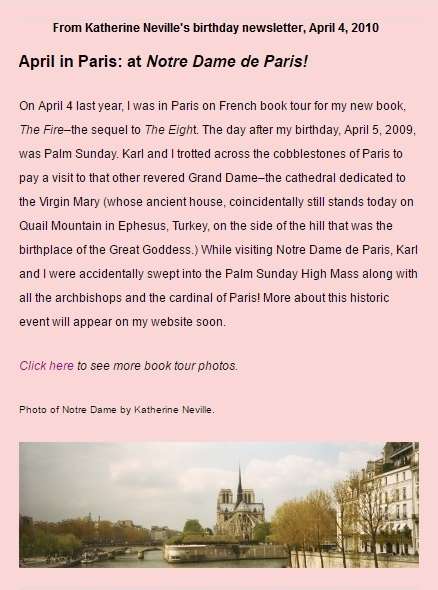
















 .
.













